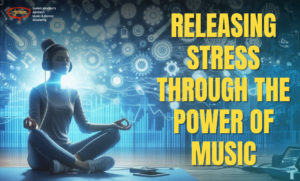From time immemorial, music has found a way to seep into the lives of human beings and continues to prove it’s worth in the present day. Naturally, this long-living companion has made a tremendous (and heartily appreciated) impact on the ever-evolving brains of people.
Right from “If you’re happy and you know it, clap your hands!” to “Clap along if you feel like happiness is the truth”, the feeling of happiness comes hand in hand with music. Despite happiness having a complex definition, the emotion is unfamiliar only to a select few.
Although as the world faces unprecedented threats and smiles wither and wobble throughout the globe, music seems to come up as a reliable crutch. Recent research suggests that not only does listening to music regulate blood flow and make you tap your feet along, it also helps release feel-good hormones like endorphins, serotonin and dopamine. But one does not need to rely purely on research and studies to feel this. Music therapy, a form of palliative care, is getting increasingly popular thanks to its impact on patients with a range of disorders like anxiety, depression, dementia and Alzheimer’s and is widely used in cancer centers, schools, alcohol and drug recovery programs and psychiatric hospitals. Banking on the interaction of music with the brain, music therapy is built around the results required and attuned to the best interest of patients, i.e. some patients react well to listening music while some, to playing it. While one doesn’t need to be suffering or in pain to enjoy music and reap it’s full benefits, studies have shown a drastic difference in stress and pain levels before and after exposure to music.
While the direct impact of music may be elevating one’s mood, its indirect impact gives it a tough competition. Science says that an upbeat tune may increase the feel-good hormones, but a sad song might also do the same. As a melancholic composition brings to surface negative emotions that a person may have, which might lead to a good cry session or two, the cathartic effect brought on right after is quite similar to the euphoric one.
As we set out on a journey to find happiness, whether by taking self-help books as a guide or relying on the traditional spiritual route, it is important to realise that while happiness as an end goal is crucial, so is happiness as a pit stop. As music and science join hands to bring this vision to life, one must also pause, take a breather, and in the words of ABBA remember that the night is young and the music’s high, with a bit of rock music, everything is fine!




